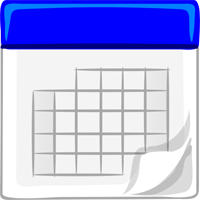Tags

The months of the year in Icelandic will likely look familiar, as they are similar to English and other related languages. They are easy to learn and work with since they do not change form (decline), but remain in the same form as you see them in the nominative case. Just as the days of the week are not capitalized in Icelandic, neither are the names of the months. Let’s look at the months themselves and then how to use them in expressing dates:
| Mánuðirnir – The Months | |||
|---|---|---|---|
| January | janúar | July | júlí |
| February | febrúar | August | ágúst |
| March | mars | September | september |
| April | apríl | October | október |
| May | maí | November | nóvember |
| June | júní | December | desember |
To talk about which day of the month it is, or on what day something is happening, we need numbers 🙂 But not just any numbers, ordinal numbers (raðtölur)! (First, second, third, etc.) To keep it simple we’ll just look at the ones we need to express dates:
| Ordinal Numbers (1 – 31) | |||||
|---|---|---|---|---|---|
| 1 | fyrsti | 11 | ellefti | 21 | tuttugasti og fyrsti |
| 2 | annar | 12 | tólfti | 22 | tuttugasti og annar |
| 3 | þriðji | 13 | þrettándi | 23 | tuttugasti og þriðji |
| 4 | fjórði | 14 | fjórtándi | 24 | tuttugasti og fjórði |
| 5 | fimmti | 15 | fimmtándi | 25 | tuttugasti og fimmti |
| 6 | sjötti | 16 | sextándi | 26 | tuttugasti og sjötti |
| 7 | sjöundi | 17 | sautjándi | 27 | tuttugasti og sjöundi |
| 8 | áttundi | 18 | átjándi | 28 | tuttugasti og áttundi |
| 9 | níundi | 19 | nítjándi | 29 | tuttugasti og níundi |
| 10 | tíundi | 20 | tuttugasti | 30 | þrítugasti |
| 31 | þrítugasti og fyrsti | ||||
So now you are all set to answer the question:
Hvaða mánaðardagur er í dag? – What day is today?
Í dag er tuttugasti og sjöundi mars. – Today is the 27th of March.
Just as in the post about the days of the week, you can construct a very simple drill to learn not only all of the months of the year but also all of the ordinal numbers from 1 to 31, using the following:
Hvaða mánaðardagur er í dag? – What day is today?
Hvaða mánaðardagur er á morgun? – What day is tomorrow?
Hvaða mánaðardagur var í gær? – What day was yesterday?
Í dag er tuttugasti og sjöundi mars. – Today is the 27th of March.
Á morgun er tuttugasti og áttundi mars. – Today is the 28th of March.
Í gær var tuttugasti og sjötti mars. – Yesterday was the 26th of March.
Just work your way through every day of the year and answer those questions 😉
When you want to say that something happens/happened on a particular date, you put the ordinal number in the accusative case. Since ordinals decline like weak adjectives, you just need to change the -i ending to -a. The only exception is annar, which becomes annan.
Ég fór til Íslands annan september. – I went to Iceland September 2nd.
Þau eiga frídag þrítugasta og fyrsta desember. – They have a holiday December 31st.
Ég á afmæli tólfta mars. – My birthday is on March 12th.
So now you have no excuse for missing an appointment in Iceland 🙂
